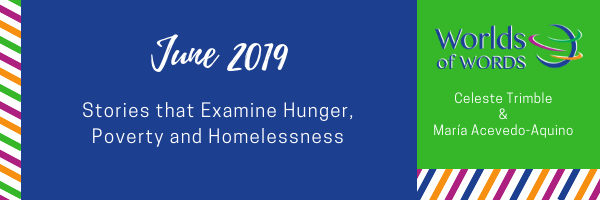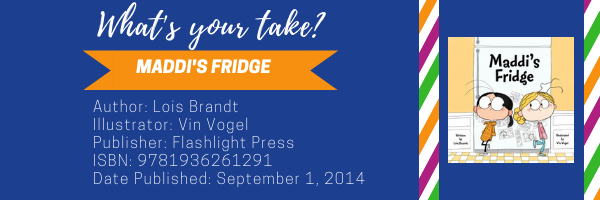By Celeste Trimble, St. Martin’s University, Lacey, WA and María Acevedo-Aquino, Texas A&M University-San Antonio, San Antonio, TX

This month Celeste and María look carefully at stories that examine issues of hunger, poverty and homelessness. In each of the stories, the characters are represented in a dignified and respectful manner. They begin with Maddi’s Fridge, written by Lois Brandt and illustrated by Vin Vogel.

CELESTE: Sofia and Maddi are friends. Sofia is great at running, and Maddi is a skilled climber. One day, Sofia looks for a snack in Maddi’s fridge and discovers that it is practically empty, but
she promises Maddi she won’t tell anyone. Sofia looks in her own fridge and it is full of nutritious foods. She wants to help Maddi and brings food to her at school, but that’s not enough. Eventually, Sofia tells her mom that Maddi and her brother don’t have enough food and they bring groceries over to Maddi’s house.
When I brought this book into my home, my 7-year-old daughter read it immediately. She was attracted to Vogel’s illustrations and curious about the title. I have spoken to her quite a bit about childhood hunger, but Maddi’s Fridge helped her turn that abstract topic into a relatable story. She began talking about a friend of hers who never has a snack at school. I appreciate the friendship in the story, friendship across socioeconomic differences. The girls have different skills, and one is consistently ahead of the other in running or climbing. By the end of the story, Maddi gives Sofia a hand so she can reach the top of the rock wall, and Sofia slows down so she and Maddi can run around at the same speed. The story is about childhood hunger, but it is also about what to do when a friend is hungry.
MARÍA: Your connections to friendship make me think about the promise they make to each other about not to tell anyone. It speaks to how deep their trust is at a young age. And Sofia really tries to keep her promise by bringing Maddie secret snacks to school. However, some promises (or secrets) are dangerous to keep, so Sofia tells her mom, and they work together to support Maddie and her family. Sofia does not tell other peers or adults, but she tells the person she feels she can probably trust the most. Is Maddi’s food insecurity and hunger solved? No, but now she has a friend to talk about it, and a friend, who she knows cares. Celeste, I wonder how your daughter thinks about promises with her peers or siblings?
CELESTE: The kinds of promises that my daughter and her friends regularly make are of the “I promise to meet you at the buddy bench at recess” variety. She says she’s never been a part of a promise as serious as the one between Sofia and Maddi. However, this question about promises prompted her to consider if she would tell an adult about the food insecurity of a friend, even with the threat of the friends being mad. Her immediate answer, “I don’t know,” turned into a hesitant, “Well, I guess I would tell,” after bringing up specifics from the story. Certainly she had never considered that there would be a good reason for breaking a promise, and this kind of nuance is difficult to talk about. So glad we had Maddi’s Fridge to support our conversation.
MARÍA: Now, I wonder about the kinds of promises that children make and the kinds of experiences that those might entail. While the story does not suggest that Maddi’s mother forces her to be silent about their situation, other children might get in trouble at home if they speak to their peers or teachers. I can see how a book like Maddi’s Fridge can elicit conversations about the things that you might do to keep a friend safe, including saving or breaking a promise. Even though the ending might suggest an unrealistic resolution to Maddi’s hunger (see Volume 9, Issue 1 of WOW Review for that discussion), the compelling writing and the thought-provoking illustrations can definitely support educators and caregivers in exploring the complexities of friendship and hunger in local and global contexts.
[Editor’s Note: WOW Currents published a booklist focused on poverty and hunger in 2017. What would you add to this list?]
Author: Lois Brandt
Illustrator: Vin Vogel
Publisher: Flashlight Press
ISBN: 9781936261291
Date Published: September 1, 2014
Throughout June 2019, Celeste and María give their takes on books that look at hunger, poverty and homelessness. Check back each Wednesday to follow the conversation!
- Themes: Celeste Trimble, Lois Brandt, Maddi's Fridge, Maria Acevedo-Aquino, Vin Vogel
- Descriptors: Books & Resources, My Take/Your Take
